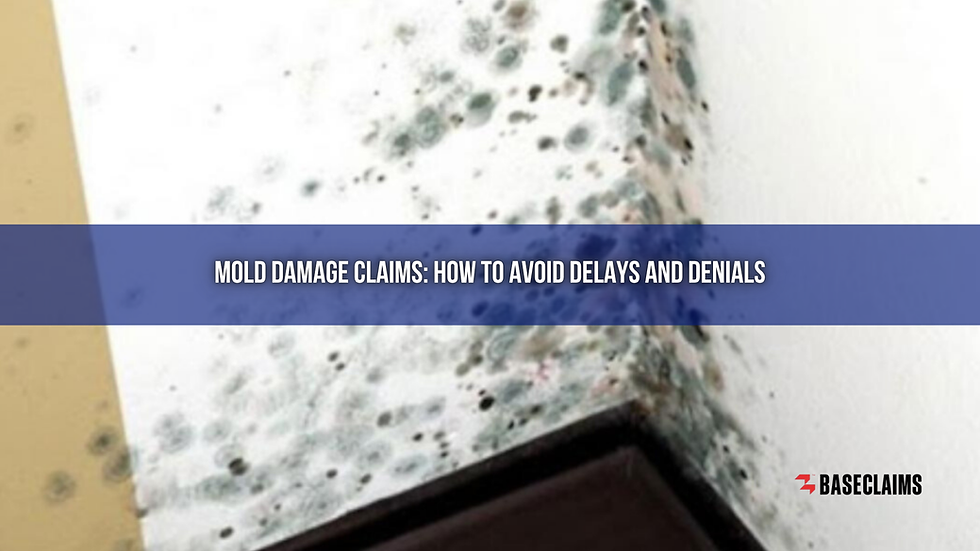Florida’s Humidity Makes Water Damage Worse: Why Fast Action Matters for Your Insurance Claim
- Benji Licht
- May 13, 2025
- 3 min read
Updated: May 28, 2025
💧 Act Fast: How Humidity Worsens Water Damage
When it comes to property damage, few elements accelerate deterioration as quickly as moisture trapped in a humid environment. Combine that with a slow response, and what begins as a minor leak can swiftly become a serious issue. In regions with high moisture levels, the urgency to respond to water incidents becomes even more critical not just for the health of your home, but also for the success of your insurance claim.
🌫️ Why Humid Conditions Make Things Worse

High humidity acts like fuel to an already burning problem. When water infiltrates your walls, floors, or ceilings, the surrounding moisture-filled air prevents proper evaporation. As a result, the dampness lingers far longer than it would in drier environments.
What follows is a chain reaction:
Wood and drywall swell and warp.
Insulation becomes soggy and ineffective.
Paint begins to peel and blister.
Metal fixtures corrode faster than usual.
This escalation is not always immediately visible. Hidden areas like subfloors, behind cabinets, or within ceiling cavities often sustain the worst of the damage—silently progressing until repairs become extensive and costly.
🦠 Mold Grows Quickly, Faster Than You Think

One of the most insidious consequences of unchecked water intrusion in a humid setting is mold. These microscopic spores thrive in damp conditions and begin forming within 24 to 48 hours. The higher the humidity, the faster they spread, often reaching HVAC systems, furniture, and structural supports.
Here’s where water damage urgency becomes more than a phrase—it’s the reality. Once mold takes hold, remediation efforts are not only more expensive, but they can also delay your ability to claim fast from your insurer due to complications with proof, coverage, and compliance.
⏳ Why Delaying Mitigation Risks Your Insurance Claim
Insurance providers are quick to scrutinize how promptly a homeowner responded to water-related damage. Any visible neglect—especially in high-humidity areas—can be interpreted as failure to mitigate losses.
This can lead to:
Lower settlements
Partial denials
Increased claim processing time
A delayed response might even give the impression that the damage occurred gradually over time, a category that some policies may not cover fully.
Working with experienced professionals like Base Claims public adjusters eliminates this risk. They move quickly to document the damage, organize the necessary steps for mitigation, and secure the evidence you need to support your case effectively.
🚨 Signs That You’re Already Falling Behind
In high-humidity zones, signs of lingering water damage appear fast. If you notice any of the following, you’re likely already behind in your response timeline:
A musty or damp odor that won’t fade
Discoloration on walls or ceilings
Peeling paint or wallpaper
Bubbling under hardwood floors
Unusual increases in your indoor allergy symptoms
These aren’t just cosmetic issues, they're red flags that your home may already be harboring deeper structural or air quality problems due to humidity damage.
📋 What You Should Do Immediately
Taking action within the first 24 hours is essential. Here’s a quick response guide:
Stop the water source: Shut off water lines or patch the leak if possible.
Document the scene: Take clear photos and videos of all affected areas.
Remove excess water: Use mops, towels, or pumps to reduce standing water.
Ventilate the space: Use fans and dehumidifiers to begin drying immediately.
Call a professional: Contact Base Claims public adjusters to guide the process and ensure your insurance filing begins without delay.
Don’t wait for your insurer to respond before you act. Immediate steps strengthen your claim.
🤝 The Role of Public Adjusters in Fast-Tracking Claims
Dealing with water damage is stressful. You’re juggling repairs, paperwork, and uncertainty all while trying to live in a potentially unsafe environment. That’s where Base Claims public adjusters step in.
They are not insurance company representatives. They work for you, managing all aspects of your claim. Their responsibilities include:
Independent assessment of damage
Gathering evidence that supports full coverage
Negotiating directly with the insurer
Ensuring fair compensation for every aspect of loss
With their help, homeowners gain the upper hand in a process that’s often stacked in the insurer’s favor.
⚡ Water Damage Doesn’t Wait, Neither Should You
Humidity doesn’t just increase the chance of damage — it shortens the time you have to respond effectively. Waiting even a day can mean the difference between a straightforward repair and a full renovation, or between a successful insurance claim and a partial payout.
Understanding the stakes, acting promptly, and seeking professional guidance ensures you’re not caught off guard.
In high-moisture climates, urgency isn’t optional — it's essential.
Benjamin Licht 954-589-8710
Office 954-466-5730
Don’t wait until it’s too late






Comments